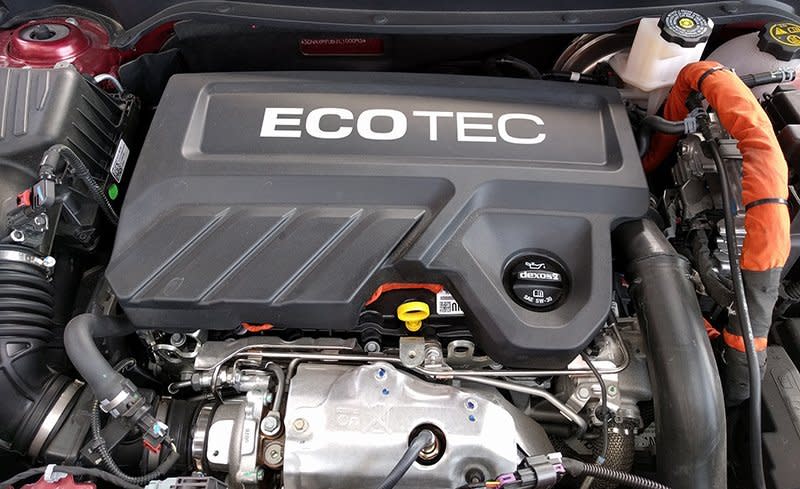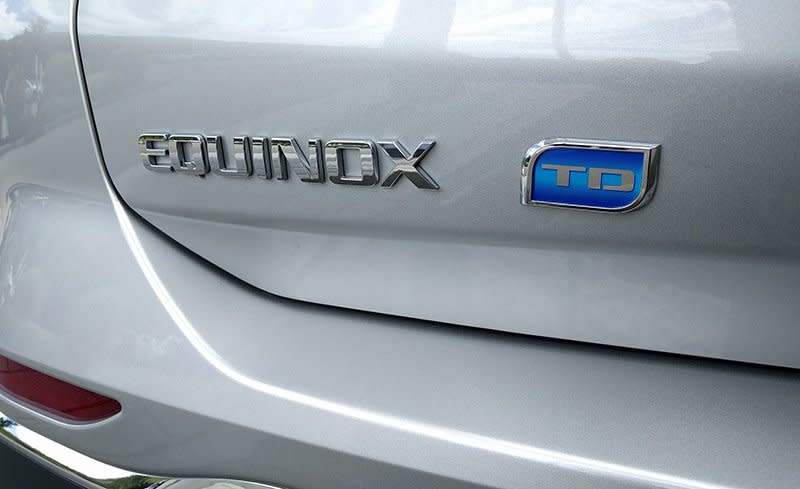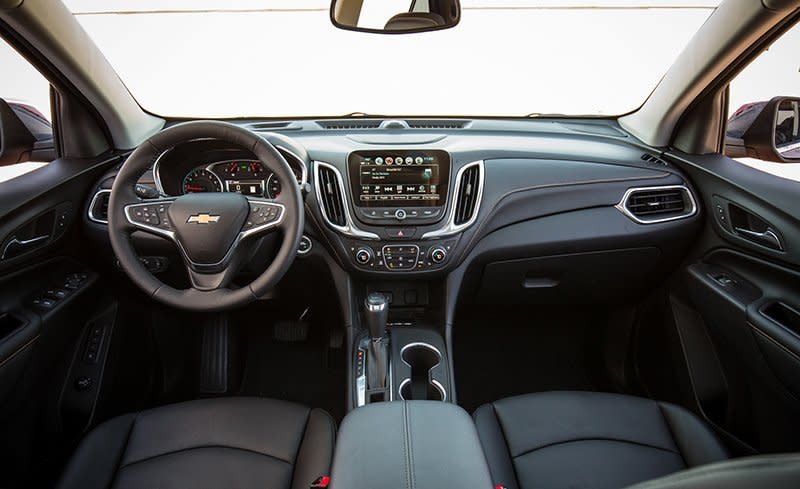2018 Chevrolet Equinox Diesel

The Chevrolet Equinox has undergone a comprehensive redesign for 2018, and the results on the whole have been impressive. Although the compact SUV is trimmer than its predecessor, the user-friendly interior is nearly as roomy. Having shed hundreds of pounds of flab, it has further toned up with skillful chassis tuning. The Equinox came out of the gate with a somewhat underwhelming base engine, a turbocharged 1.5-liter inline-four making just 170 horsepower, but quickly followed that up with the option of a far livelier 2.0-liter turbo with 252 ponies. Now comes a third choice, a 1.6-liter turbo-diesel that promises to be the fuel-economy play of the bunch.
This is the same diesel that has been available in the Chevy Cruze (and also will be offered in the Equinox’s platform-mate, the GMC Terrain). Output is 137 horsepower at 3750 rpm and 240 lb-ft of torque at 2000 rpm. Whereas the diesel is paired with a nine-speed transmission in the Cruze, here it mates to a six-speed automatic. General Motors engineers claim that in the heavier Equinox, the nine-speed didn’t return a fuel-economy advantage, so there was no reason to use it. The Cruze also offers the diesel with a six-speed manual, but, unsurprisingly, the stick shift isn’t available in the Equinox.

None Too Thirsty
As it is, the diesel’s EPA numbers are worth crowing about. The front-wheel-drive version is rated at 28 mpg city, 39 mpg highway, and 32 mpg combined. All-wheel drive knocks the highway figure down to 38 mpg, but the others stay the same. Those highway numbers are the best among compact SUVs, while the city figure is exceeded only by hybrid versions of the Toyota RAV4 and the Nissan Rogue. It’s possible that the real-world highway mpg might be even better; in our 75-mph highway fuel-economy test of the Cruze diesel, we recorded 52 mpg, beating the EPA highway rating by 5 mpg. Even if you merely equal the EPA figures, the highway cruising range is 580 miles for the FWD model and 590 miles for the AWD version (which has a slightly larger tank).
Aiding the fuel-economy cause for all Equinoxes in the city is auto stop/start, which is standard across the lineup. As is becoming GM practice, the system cannot be switched off, which may be irksome to some drivers. We’d characterize the diesel’s restart smoothness as better than some but not the best in the field.
None Too Affordable
Impressive though it may be, the diesel engine’s fuel economy comes at a price, and that price can be fairly hefty. The diesel skips the L and LS trim levels and is available only in the fancier upper two grades, LT and Premier. The Equinox LT diesel starts at $31,435, which is $3740 more than the LT with the base engine—although the diesel brings with it additional standard equipment; compared with the LT 2.0-liter, the diesel is $1345 more. On the Premier, the diesel represents a $2195 upcharge over the base engine but is $600 less than the 2.0.

Without looking at the window sticker or the discreet blue badge on the tailgate, one might not realize a diesel lurks under the hood. Fire up the engine, and there’s no telltale clatter, although there is some vibration at idle once you shift into drive. It’s at that point that the diesel is most evident. There’s a subdued growl under acceleration, but it’s not the gargling-gravel sound that once normally characterized diesels. Cruising at highway speeds, the engine is virtually silent—indistinguishable from a gasoline four.
None Too Quick
Chevy’s estimates have the diesel trailing by a full second the base 1.5-liter turbo from zero to 60 mph—and the 1.5 is no rocket sled. The 1.5-liter Equinox with all-wheel drive took 8.9 seconds to reach 60 mph in our testing, which suggests the diesel will do it at a glacial, 10-ish-second pace. It’s true that, with the accelerator matted, response can be wanting at higher speeds, but it was still brisk enough off the line to chirp the tires in the front-drive version we drove. Really, though, the diesel makes a much peppier account of itself in less urgent calls to the engine room, where a mild prod of the pedal brings plenty of initial shove, particularly at around-town speeds. And the transmission, given only six gears to play with, isn’t overly busy. Those who think of diesels as ideal for towing will be disappointed, however, to learn that the Equinox diesel is rated to tug just 1500 pounds. (The 2.0-liter gas engine, meanwhile, earns a 3500-pound rating.) Blame the diesel powertrain’s cooling requirements, we’re told.

In order to keep things kosher at the business end of this powertrain, Chevrolet uses an exhaust aftertreatment system that requires diesel-emissions fluid (DEF). Depending on driving patterns, that 4.9 gallons of fluid should last 5000 to 6000 miles; the need for a refill is communicated via a message in the instrument cluster.
The subject of diesel emissions inevitably brings to mind VW’s cheating scandal and the damage it has done to the market for all diesels in the U.S., where several automakers are scaling back their plans to use compression-ignition powerplants. GM, though, is an exception. “We don’t think customers feel betrayed by the technology,” says Dan Nicholson, GM vice president for propulsion systems, choosing his emphasis deliberately. “We think the customers are still out there. We would like to court them. We would like to conquest them.” If indeed they are still out there, the Equinox diesel—with its quiet operation, strong fuel economy, and popular crossover body style—would seem to be a pretty effective net with which to catch them.
Specifications >
VEHICLE TYPE: front-engine, front- or front-/all-wheel-drive, 5-passenger, 4-door hatchback
BASE PRICES: LT, $31,435;
Premier, $33,930
ENGINE TYPE: turbocharged and intercooled DOHC 16-valve diesel inline-4, aluminum block and head, direct fuel injection
Displacement: 98 cu in, 1598 cc
Power: 137 hp @ 3750 rpm
Torque: 240 lb-ft @ 2000 rpm
TRANSMISSION: 6-speed automatic with manual shifting mode
DIMENSIONS:
Wheelbase: 107.3 in
Length: 183.1 in
Width: 72.6 in Height: 65.4 in
Passenger volume: 103 cu ft
Cargo volume: 30 cu ft
Curb weight (C/D est): 3750–3850 lb
PERFORMANCE (C/D EST):
Zero to 60 mph: 10.5–10.6 sec
Zero to 100 mph: 27.6–28.0 sec
Standing ¼-mile: 17.2–17.3 sec
Top speed: 115 mph
FUEL ECONOMY:
EPA combined/city/highway: 32/28/38–39 mpg

 Yahoo Autos
Yahoo Autos 